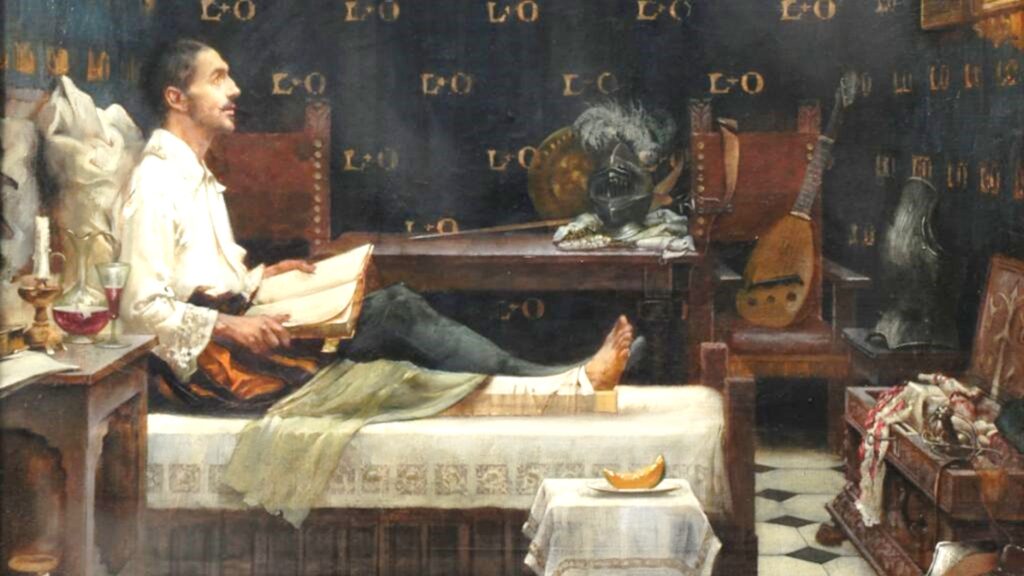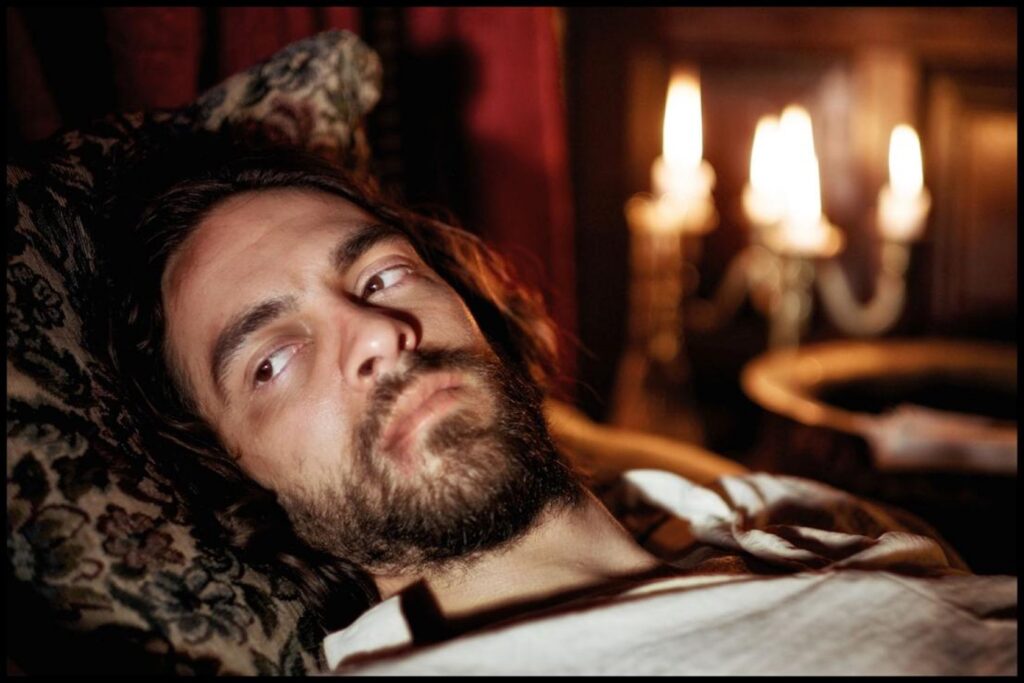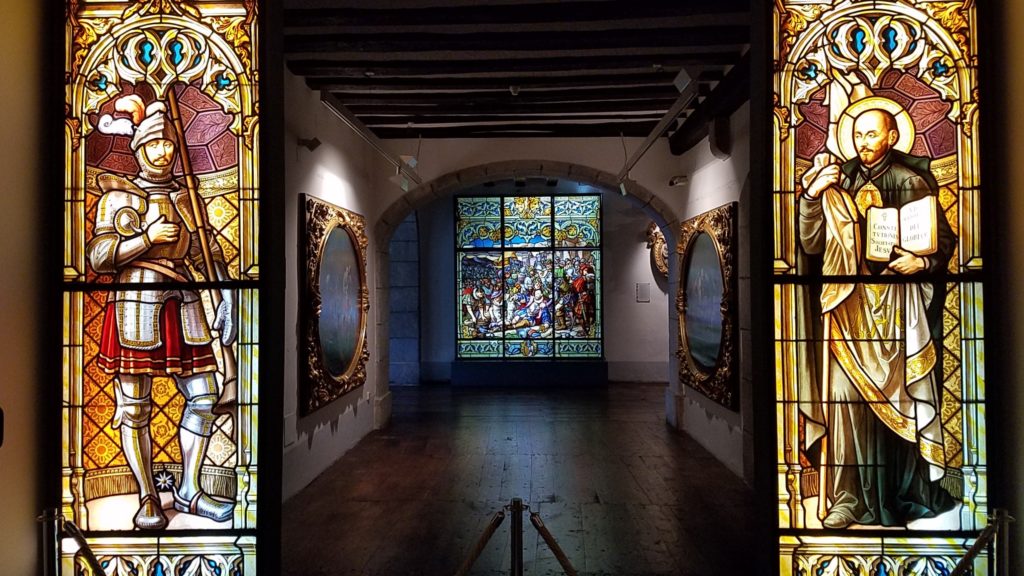
Chap. 3 Recovering at Home: Loyola again
Broken bones don’t heal quickly, and Ignatius’s injuries were as bad as you can imagine. It would be months before he could walk again, so he’d have to stay in bed until then. It turns out this bed would be familiar to him. When he was transported home, his family carried him up to the fourth floor of the Loyola house and placed him in the bedroom he grew up in. It seemed like the best place to put him, but this must have been humiliating for Ignatius. He had lived in luxurious palaces throughout Spain, made friends with the most powerful people of the realm, and fought on the battlefield for his native country. Now he was being treated like a kid again.
But Ignatius couldn’t worry about humiliation right now. He was still in a lot of pain, and it wasn’t clear if he would survive his wounds. The pain became so great that he couldn’t even eat anything. His condition grew worse and worse until finally his brother brought in a priest to give him his last rites. The doctors told him he wouldn’t survive the night, so on June 28, 1521, Ignatius made his final confession to the priest and said farewell to the members of his family.
When he awoke the next day, he must have been surprised. He was still alive, and he was actually starting to feel better. His family must have been relieved as well, and the first thing he wanted to know was how the war against France was going. He never stopped thinking about his fellow countrymen at Pamplona, and he held out hope that he could rejoin them on the battlefield soon. His family gave him the good news and the bad news. The good news was that the Spanish reinforcements helped the troops at Pamplona defeat the French and regain control of the town. The bad news was that the king of Spain removed the viceroy from his position because he had run away when the French invaded the area. Even if Ignatius did recover soon, his boss was out of a job, and it wasn’t clear what Ignatius would do with his life next.
He was determined to be a knight, though. Bringing glory to Spain and achieving fame for himself was something he dreamed of ever since he was a boy. It’s also what his older brother Juan had done when he died fighting for Spain in 1496. After a few days at home Ignatius’s legs were feeling better, but there was still a problem with the right leg. Part of the bone was bulging out at the knee, and Ignatius knew people would make fun of him since it looked ugly. He also knew he wouldn’t be able to fit his right leg into the long boots that knights had to wear, so he told his brother Martín that he wanted the doctors to remove the excess bone sticking out.
This was insane. Sawing off a piece of your bone was more pain than anyone could bear, and you could risk infection and even die from the surgery. Plus his brother was already mad at Ignatius for how he got here in the first place. Martín had tried to help Ignatius at Pamplona, but when the town council refused to let him take command of the fortress, Martín headed back to Loyola. He never thought Ignatius would try to marshal a defense against the French army with so few men, and now that Ignatius was back home Martín yelled at his little brother for being so stupid. A smarter man would have known he was outmatched. A smarter man would also know not to to saw off part of his leg bone just to look better. Ignatius was lucky to be alive after getting hit by a cannonball, and now he was taking a huge risk with this unnecessary procedure. But Ignatius was more stubborn than his older brother, and they summoned the doctor to perform the surgery. Once again, there was no anesthesia back then, so Ignatius felt him sawing through his bone the entire time. When all was said and done, the extra bone no longer stuck out, but now the right leg was a little shorter than the other one. As if Ignatius hadn’t been through enough, he decided to prolong his agony for the next several days with another questionable procedure. He had the doctor stretch out his leg and attach weights to it to make it the same length as the left one. They did this multiple times, day after day, and the pain must have been tremendous.
It didn’t work, though. The leg was still too short, meaning Ignatius would have to walk with a limp the rest of his life. He didn’t realize this yet because he couldn’t practice walking again until his leg healed completely. In the meantime he’d have to lie in bed for nine straight months, and the boredom quickly became unbearable. He probably spent a lot of time staring up at the ceiling and recalling his days as a boy living in this same room. He probably thought about his mother, who would come to visit him in this same bed when he was sick – at least as best as he could remember. She died more than twenty years ago, and now the woman taking care of him was his brother’s wife, Magdalena de Araoz. Ignatius was a difficult patient, always restless and always wishing he could do something that would make him famous someday. He was thirty years old now, and he hadn’t done anything that would bring him glory. The next best thing was reading tales of chivalry where a hero would do some valiant deed, inspiring him to do the same once he could walk again. So Ignatius asked if they had any such books in the house that would help him pass the time.

They didn’t. The only books they had were religious ones. The first one was about Jesus, and the second was about the saints. Ignatius was disappointed, but they would have to do. What else could he do? He was stuck in a bed all day long. Besides, it wasn’t like these books would be too difficult for him. Most people could not read much back then, but Ignatius was well educated and could read and write from an early age. The problem was that he struggled to stay focused. Every time he’d read something he’d become distracted and start daydreaming, especially about women. He always loved impressing the ladies, and he loved fantasizing about them even more. Books about Jesus and a bunch of holy people weren’t going to take his minds off these distractions.
But he would try. Every day he would pick up one of the books and read a page or two, yet his mind would quickly drift off for a bit. Perhaps he was a knight helping Spain defeat France, or maybe he was back in a royal palace trying to earn a place of power serving King Charles. This daydream would last for a while, and then he’d come back to the book again and try reading a little more. His favorite thing to fantasize about was a certain woman who was very lovely and very famous, but Ignatius never told anyone what her name was. Whenever he dreamt about her, he’s spend two or three hours imagining he was doing something noble to win her favor. She must have lived far away, because his daydreams would always involve him traveling to a distant land to find her, impress her with his clever wit, and win her over by doing some acts of gallantry. It was probably a longshot to win her over, but Ignatius kept dreaming about her anyway. He later admitted that the woman was very high up in the royal hierarchy, higher than a countess or a duchess, and our best guess was that she was Infanta Catalina of Austria. He probably met her when she toured Spain a few years earlier and Ignatius would see her at various tournaments as Spanish and Portuguese noblemen sought to marry her. Everyone wanted her, and Ignatius definitely wanted her. He was completely infatuated with her.
He thought about her a lot while he laid in bed with his broken leg, but his daydreams would eventually change. Every time he’d return to one of the books he was reading, he became a little more captivated by Jesus and the saints. They were brave too, and they did noble things that made them famous. In fact many of them risked their lives for others. Instead of being a champion on the battlefield, what about being a champion for the faith? Ignatius was particularly struck by the lives of St. Dominic and St. Francis of Assisi. They were famous throughout much of Europe, but Ignatius had never taken the time to learn about them firsthand. It turned out he had a lot in common with them. They grew up in wealthy families and had comfortable lives but felt unsatisfied by the path their fathers had laid out for them. Each decided to give up his wealth and embrace a lifestyle of simplicity, dedicated to prayer and helping the poor. Their lives were so inspirational that numerous people decided to join them, and they formed communities of people called Dominicans and Franciscans who promoted the Christian faith and spent their lives serving others. If Dominic and Francis did these great things, couldn’t Ignatius do such things as well? Maybe even greater things?

Daydreams took up much of Ignatius’s time now, and he struggled with the two types. On the one hand he dreamt about being a knight, impressing a fair lady, and gaining honor and prestige, and on the other hand he dreamt about doing something great for God like Dominic and Francis did. The first type of daydream was nice, but he always felt empty afterward. It never really satisfied him but left him feeling restless, as if it wasn’t really what he wanted to do deep down inside. The second type of daydream had the opposite effect. He enjoyed thinking about imitating Jesus or the saints, and long after the dream was over he continued to feel a sense of joy and peace. He even wanted to make the long journey to Jerusalem to see where Jesus had lived and taught, and he also wanted to see if there were people there he could help like Dominic and Francis did.
These two types of dreams filled Ignatius’s mind for weeks. As he wrestled with the two kinds, he eventually realized where God was calling him. Ignatius would have to abandon all his dreams of earthly glory and give up the life of a knight and chasing after women. Instead he would dedicate his life to God and helping other people. Later Ignatius would come up with a type of prayer that helps us understand how this change happened inside him. It’s called the “Call of the King.” Ignatius encourages us to imagine a powerful king who has summoned the knights of his realm before him, and he delivers a riveting speech to them before heading off to war. He tells them about a terrible enemy that they need to vanquish, and he inspires his knights with eloquent words, explaining that things might be difficult, but they will share in the same luxurious rewards that the king does when they triumph over their foes. Every knight listening is moved by the king’s words and ready to go to the ends of the earth to fight for him.
Then Ignatius encourages us to imagine a second scenario just like the first. The only difference is that the king is Jesus. You have been summoned to appear before him, and Jesus now delivers a stirring speech about how he needs you to help him triumph over evil. Things will be hard, and you will have to make sacrifices, but once victory is achieved your reward will be beyond measure. In fact you will have everlasting joy in heaven. All you have to do is follow him.
For Ignatius the choice is simple. You must dedicate your life to Jesus and helping others. This is the way to true happiness. As Ignatius lay there in bed going through these different scenarios, the commitment to follow Jesus finally came easy for him. After he made this decision, he felt like a new person. There was a sense of calm about him and a sense of purpose. His family members noticed this change too. He wasn’t asking about the war against France anymore or acting like he wanted to be a knight again. He seemed different now, more at peace. In fact they said he was like a new man. He also kept talking about God all the time. The Loyolas were Catholic but didn’t like to talk about religious topics very much, and now Ignatius couldn’t stop talking about them! They also noticed that Ignatius would spend much more time in prayer. He even spent hours gazing out the window at the stars and the sky and at anything in nature, especially the flowers. He was captivated by the amazing world that God had created.

After the nine months had ended Ignatius was well enough to walk again. His family assumed he would stay in Azpeitia now, but Ignatius started asking lots of questions about a famous monastery in Seville instead. Why the sudden interest in this place? He never asked about it before. They knew Ignatius had been affected by his injury and by the holy books he was reading, but now it seemed like he wanted to throw away his whole life and do something radically different. Maybe he couldn’t be a knight anymore, they thought, but he was still a Loyola and would still live an aristocratic lifestyle. They had a reputation to maintain, so Ignatius had to live the way people expected him to.
But Ignatius had other plans. This way of life was over for him, and he wanted to seek out someone spiritual who could help him on this new path. The monastery was a great place to start, but Ignatius’s family wouldn’t let him go. Most of them were confused by Ignatius’s behavior, and his oldest brother was absolutely furious. Martín seized Ignatius and led him into another room, telling him he was being ridiculous. Ignatius refused to change his mind, so his brother pulled him into another room and begged him to stop making a fool of himself. He pleaded with Ignatius to stay at the Loyola mansion with them. Everyone still had high hopes for him, despite his injury. With all the education and training Ignatius had received, he could still do something important with his life. He could still make his family proud.
But this life was over for Ignatius. He realized he wasn’t going to convince his brother to let him leave, so he had to come up with an alternative plan. His legs were better now, but he couldn’t walk very far on his own because of his bad limp. Staying at home wasn’t going to work since his family would never stop forcing him to live the life they wanted for him. Ignatius would have to think of something clever that would get him out of the house and also keep his brother happy. So he told Martín that he wanted to see his old boss in Navarre. The viceroy had just been named the Duke of Najera in Navarrete, and by traveling to see him Ignatius would make it seem like he wanted to resume his former career as an aristocrat. Martín was suspicious, but he could see how restless Ignatius had become, and visiting the duke seemed like a better option than going to a monastery. Plus it was in the opposite direction. So he let Ignatius go, provided that he took some people with him to make sure he made it to his destination. After all, three strong men should be able to keep an eye on someone who could barely walk, right?
Reflection Questions:
- What are my greatest dreams? What do my dreams say about me and what I want in life?
- What am have I done in my life that brings greater glory to God? What am I doing now? What can I do in the future?
Click here for chapter 4
